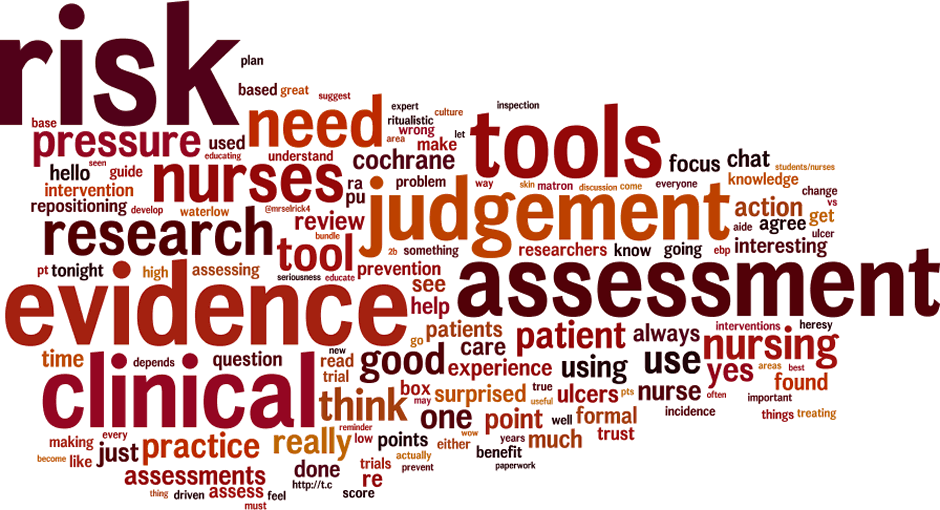|
|
Tweet
This chat : Pressure ulcers – risk assessment? Visit: http://www.wenurses.com/chatnow for easy tweet chatting. Full chat details can be found here: http://www.wenurses.com/MyNurChat/archive/archivewenurses25032014.php Follow @WeNurses on twitter - http://www.twitter.com/WeNurses If you are new to Twitter why not check out our Twitterversity? http://www.wenurses.co.uk/Resources/twitterversity.php Twitter @WeNurses noreply@wenurses.co.uk false DD/MM/YYYY
Preventing pressure ulcers is a really fundamental element of caring for a patient, isn't it? Tools to help assess a person's risk of developing a pressure ulcer have been in use for half a century, but do they actually result in fewer pressure ulcers, or do they take up nurses' time which could be better spent with the patient?
A Cochrane review which looked for evidence from randomized controlled trials on the effect of structured risk assessment on pressure ulcer prevention has just been updated and the results may surprise you. The review includes just two trials and only one of high quality. Neither trial found any difference in the incidence of pressure ulcers between the patients for whom a structured risk assessment was completed and those for whom this was not done. So currently there is no reliable evidence to suggest that the use of structured, systematic pressure ulcer risk assessment tools (themselves based on clinical judgement, not evidence) reduces the incidence of pressure ulcers.
This discussion will explore the nurse's role in pressure ulcer risk assessment and prevention and address these questions: • Should nurses be doing something routinely for which there's no good evidence of benefit? • What is the place (if any) of risk assessment tools as an aid to clinical judgement? • What do you think are the most important things you do to preserve skin integrity? • What do you see as the pros and cons of structured pressure ulcer risk assessment? • What does this mean for patients?
Pre-chat reading: Nurses under pressure: do risk assessment tools help prevent pressure ulcers? Evidently Cochrane blog February 14 2014 http://evidentlycochrane.wordpress.com/2014/02/14/nurse...
Moore ZEH, Cowman S. Risk assessment tools for the prevention of pressure ulcers. Cochrane Database of Systematic Reviews 2014, Issue 2. Art. No.: CD006471. DOI: 10.1002/14651858.CD006471.pub3. http://onlinelibrary.wiley.com/doi/10.1002/14651858.CD006471.pub3/abstract @SarahChapman30 is a former nurse who now works for @ukcochranecentr, where she tweets about Cochrane Evidence and writes weekly blogs for Evidently Cochrane with the aim of making Cochrane reviews and other evidence more accessible to health practitioners and patients.
|
| Contributors to this chat, click on their profile pic to follow them... |
| |
| This chat's wordcloud: |
 |
|
Host Chat Summary by @AgencyNurses: This discussion really started out as a bit of an experiment as we often hold discussions around subjects and bring in evidence however this discussion took the evidence and gave the #NurseCommunity the opportunity to talk about it, examine it and discuss its implications. The discussion was opened by @UKCochraneCentr:
To which there were diverse replies: The @UkCocraneCentr the followed this up with a really interesting question: The discussion that followed was utterly fascinating exploring why we complete pressure ulcer risk assessments and it seemed that they really aren't in place to risk assess pressure ulcers at all but there to document that we have assessed for that all important paper trail, to provide us with proof to gain the necessary equipment for pressure relief or to provide us with a safety net for our clinical judgment. It seemed that the simple task as completing a pressure ulcer risk assessment have become a complex and ingrained activity. However when looking at the evidence it is clear that pressure ulcer assessments offer us nothing in the reduction of pressure ulcers and clinical judgment is as effective, but is it too risky to drop the risk assessments? The @UKCochraneCentr challenge participants a little more by asking: So given that we have a finite amount of time and people resources what is the riskier option, working with the risk assessments or working with the evidence?
The discussion had many twists and turns and it really is worth having a read of it all but there were some brave nurses who decided to take some action: However the last word goes to @Bartontd who spoke some final words of wisdom at the end of the discussion: We will be revisiting this discussion in 6 months' time to see if anything has changed and to feedback any experiences – so see you all in October :-) |
| Transcript via Symplur
|